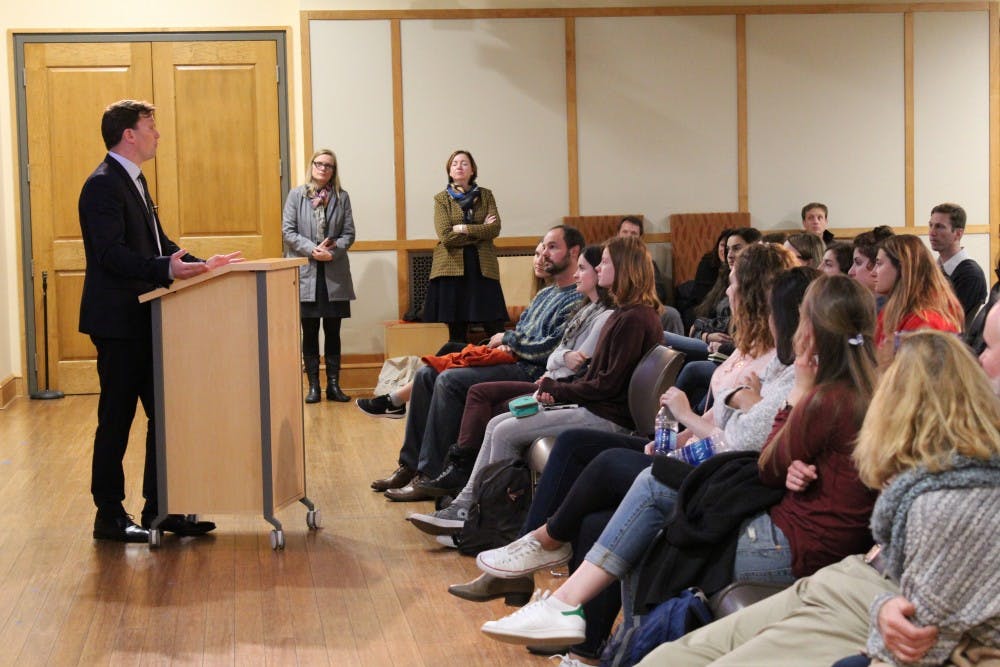His Excellency Lars Gert Lose, Danish Ambassador to the United States, visited the University of Richmond on Wednesday to give a public talk as part of International Education Week.
The talk took place in the International Commons and focused on Denmark’s green transition program and how such a model could potentially be adopted by the United States.
Lose has served as Danish Ambassador to the U.S. since 2015.
During his talk, he said that his main goal at present was to encourage a green transition within the U. S. He also detailed Denmark’s own green transition, including its origins in the development of the welfare state.
“We have this society building a welfare state over the past 100-150 years," Lose said. "We have a very strong social contract. It is the framework around everything we have done in the green transition because everything we have done has generated trust in the government.”
Aspects of that social contract include free public healthcare, free higher education and guaranteed housing even if you become unemployed. The price citizens have to pay for such a social contract is an income tax of approximately 55 percent to 60 percent, Lose said.
Lose acknowledged that such a welfare state and green transition was easier to accomplish in Denmark versus the U.S. because of its type of parliamentary government.
“You always have to make deals with the left or the right," he said. "That makes politics very compromising, very pragmatic and very consistent, no matter who is in control of the government. This was the foundation of the green transition.”
Lose went on to explain that in 1972 during the oil crisis, Denmark was hit very hard economically. As a result, the government resolved to begin a transfer to greener sources of energy. As the climate change movement of the 80s began, the desire to transfer to more sustainable energy grew.
“42 percent of our electricity is fueled by wind power,” Lose said. “And it will be 50 percent by 2020.”
Lose also talked about the efficiency of Denmark's wastewater management system, and how the country is using it to create energy instead of spending it, as well as how these renewable energy efforts have made Denmark the most energy-efficient country in Europe.
“The important story for us to learn here is that we have proven in practice that there is no contradiction between economic growth and a green transition,” Lose said. “Our economy since the 1980s has grown by 80 percent, and we have kept our energy consumption at the same level.”
Enjoy what you're reading?
Signup for our newsletter
Lose hopes the U.S. will adopt similar policies, using the idea that a green transition would be beneficial to the economy.
“Green technology today is essentially good business,” he emphasized. “There is a lot of job creation potential. I am 100 percent convinced we will see a green transition in the United States.”
During the question and answer portion of his talk, Lose answered various questions about both Denmark’s current sustainability policies and potential ideas for the U.S.
When asked how to get around climate deniers in the government, Lose proposed reframing environmental legislation and sustainability legislation as an economics issue as opposed to a climate change issue.
He noted that data companies invest in Denmark because of its sustainability efforts, and that the same thing could potentially occur within the U.S.
At the end of his talk, Lose reemphasized climate change and climate change prevention, especially due to its immediate impact on Denmark.
“If you don’t believe climate change is real, go to Greenland,” he said. “Greenland is the canary in the coal mine. This is where the immediate effects are from. This is why it is such a big issue for Danish politics.”
There were 50 students registered for the event but approximately 64 people showed up. Taylor Hoogsteden, sophomore, came because of her interest in seeing the ambassador.
“I have been to Denmark a few times, and everyone there is so happy and warm and welcoming,” Hoogsteden said. “It was nice to get to see the ambassador in person.”
Office of sustainability employee Cassandra Collins was also in attendance.
“It is a really unique and cool opportunity to be able to listen to an ambassador speak on campus,” Collins said.
After his talk, Lose accompanied students and staff on a candle walk from the International Center to the Heilman Dining Center.
At various points along the candle walk, 16 different stations advertised various elements of Danish culture and provided information on how to study abroad in Denmark. The dining hall featured a Danish-inspired dinner, and Lose briefly made an appearance there before departing.
Contact news writer Julia Raimondi at julia.raimondi@richmond.edu.
Support independent student media
You can make a tax-deductible donation by clicking the button below, which takes you to our secure PayPal account. The page is set up to receive contributions in whatever amount you designate. We look forward to using the money we raise to further our mission of providing honest and accurate information to students, faculty, staff, alumni and others in the general public.
Donate Now



